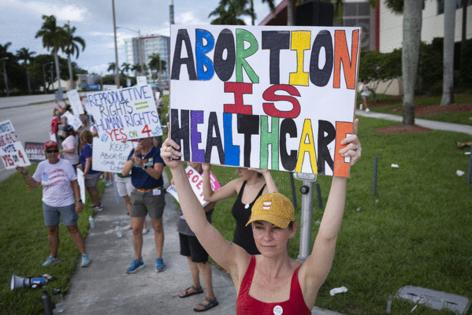After US Supreme Court decision, Florida issues more rules around emergency abortion care
Published in Political News
FORT LAUDERDALE, Fla. — Hours after a U.S. Supreme Court decision upholding emergency abortion care, Florida health regulators issued new rules with little fanfare late Thursday to clarify how medical providers should respond to pregnant women with complications that put them in peril.
The new rules issued by the Agency for Health Care Administration address how hospitals should keep medical records and what specific conditions can trigger emergency abortion care under the state’s law. In Idaho, where a strict abortion ban is in place, doctors have reported being mandated to airlift women to other states for emergency abortion care. The Supreme Court ruling is intended to prevent that from happening.
Florida’s six-week abortion ban allows for exceptions in emergencies. It says if a woman’s water breaks prematurely, attempting to induce delivery is not defined as an abortion if the fetus does not survive, nor is the treatment of an ectopic pregnancy or trophoblastic tumor, a rare growth that forms in the uterus. The state clarified those exceptions on May 2, the day after the six-week ban took effect.
However, doctors say those exceptions have gray areas and each hospital has been working on creating policies.
In the rules issued by health regulators Thursday, hospitals must keep written policies and procedures for how they respond to emergency pregnancy complications that threaten a woman’s life, review them annually, and revise them as necessary.
Anya Cook says she arrived for emergency care at Coral Springs hospital in early 2023 after her amniotic sac broke. She says the hospital cited the state’s abortion law and sent her home with antibiotics. Shortly after, she went into a bathroom and delivered a stillborn baby. The hemorrhaging and infection that followed nearly cost her life and her uterus, she said. At the time, the state had a 15-week ban in place and did not have rules for exceptions.
“I know she should have never been in a life-or-death situation trying to have our child,” Derick Cook previously told the South Florida Sun Sentinel.
Health regulators addressed Anya’s scenario in its new rules, clarifying further what should happen if a woman’s membrane ruptures prematurely. The rules issued Thurday state a patient would be admitted for observation “unless the treating physician determines that another course of action is more medically appropriate under the circumstances to ensure the health of the mother and the unborn baby.” The doctor must now document the reasons for emergency abortion care if that’s the path they take.
The rules also say health providers can perform emergency care for an ectopic pregnancy or a trophoblastic tumor, and those procedures won’t be considered an abortion. However, new language requires doctors to document the treatment in medical records.
Miami gynecologist Dr. Cecilia Grande said the rules issued Thursday by Florida’s Agency for Health Care Administration came in response to the Supreme Court ruling.
“It’s good to have clarification on these things, but there are still some circumstances that are not addressed,” she said. “There are so many other clincial sitautions that are problematic. You can’t legislate medicine.”
_____
©2024 South Florida Sun Sentinel. Visit at sun-sentinel.com. Distributed by Tribune Content Agency, LLC.







Comments